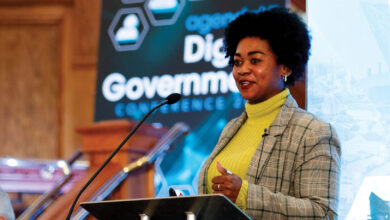Transforming digital government with AI

Deputy Director at the UK’s Government Digital Service (GDS), Mike Skelton, tells agendaNi about how the UK Government’s approach to digital public services has evolved, what challenges remain, and how emerging technologies like AI are being carefully explored to meet the changing expectations of citizens.
Skelton contextualises that, over a decade ago, digital public service infrastructure was “fragmented, inefficient, and largely inaccessible”.
“The landscape was dominated by large, centralised infrastructure projects delivered through traditional waterfall methods, with little attention paid to how people actually experienced government online,” he says.
“There were more than 2,000 government websites at one stage. That created a huge burden on the public to understand how government was structured, just to complete basic tasks. You needed to know whether something was DWP or HMRC or DVLA; and most people do not think in those terms. They just want to get things done.”
The shift came with the publication of a 2010 report by digital entrepreneur Martha Lane Fox, who called for a “radical overhaul” of how government was rolling out digitalisation. The recommendation led to the establishment of the Government Digital Service (GDS) in 2011 and the subsequent launch of GOV.UK in 2012, consolidating previously disparate services into one platform.
“GOV.UK was built around the principle that it should work for everyone,” Skelton says. “That meant rewriting content to be accessible at a reading level of nine years old. It meant designing services for mobile devices. Most importantly, it meant putting users, and not just government departments, at the heart of the experience.”
Building trust
GOV.UK attracts millions of visits every week, with traffic consistently peaking around key moments like tax deadlines, elections, or crises. Skelton is keen to highlight that GOV.UK is now a trusted source for the public, ranking alongside major technology companies in brand recognition, according to data from YouGov.
“That recognition matters because people need to know where to go for reliable, accurate information, especially in a time of growing misinformation,” he states.
Accessibility remains a top priority, with GOV.UK services built to meet the highest international standards (WCAG AA and above). Skelton describes GDS as “a standard-bearer” for good design and inclusive digital services, a role that extends beyond central government.
“We support other departments and local authorities through tools like the GOV.UK design system,” he explains. “It is a shared language of components that ensure consistency, regardless of which bit of government you are interacting with.”
An evolving landscape
Despite the platform’s success, Skelton acknowledges that “the world has moved on”, and so too must the way government serves its people. He cites changing behaviours, particularly among younger users, as a key driver of current thinking.
“There is a generation now who do not really use websites. Social media platforms are their search engines. That tells us something important: static content models will not be fit for purpose for much longer. We need to meet users where they are in a way in which they expect to interact.”
This has informed new projects under development, including a GOV.UK app, which will aim to bring together key services in a mobile-native experience. Skelton believes the app could become a “government in your pocket”, with features like notifications, personalisation, and secure integration with digital identity systems.
“It is about making services more proactive, seamless, and secure, especially for those who rely on government support day-to-day,” he explains.
Using AI
Another significant development area is generative AI, which Skelton describes as offering “huge potential, but requiring careful guardrails”.
In 2024, GDS ran a limited public trial of a generative AI tool trained exclusively on GOV.UK content, offering conversational assistance to users seeking advice. Skelton states that 70 per cent of users found it helpful.
“Trust is everything,” Skelton cautions. “We are not experimenting for experimentation’s sake. We are taking a measured, responsible approach. Our tools are built only on trusted, curated government data with no scraping and no third-party inputs. That is non-negotiable for us.”
Skelton says the team continues to test, iterate, and evaluate new applications of AI, including content summarisation and improved search, but always under the principle that “humans remain firmly in control of the experience”.
Adapting to structural change
In early 2024, GDS moved from the Cabinet Office to the Department for Science, Innovation and Technology (DSIT), part of a broader shift to integrate digital policy, innovation, and delivery under one umbrella.
“There is an opportunity here to bring emerging technologies like AI closer to real-world delivery challenges,” says Skelton. “It means more joined-up thinking across digital identity, platforms, and innovation units like the AI Incubator.”
The move coincides with a broader look at the state of digital public services. The recent State of Digital Government review highlighted areas where government must improve. In response, a new Digital Blueprint outlines how delivery teams like GDS will help tackle those gaps.
“This is about getting back to basics; making sure services work, are joined up, and meet user needs. That is still our North Star,” he says.
Staying user-first
As government faces new demands from global crises to shifting demographics, Skelton says that GDS’s mission remains unchanged: to make government simpler, clearer, and faster for everyone.
“That means continuing to challenge old ways of working, continuing to advocate for user needs, and continuing to reduce what we call ‘failure demand’ where people are forced to phone government or seek help simply because digital services did not work well enough in the first place.”
He concludes: “Ultimately, digital government is not just about shiny tools. It is about delivering the right outcomes for people, in the moments that matter. That is what good looks like and that is what we are building for.”





